China's voices of dissent
- Published
A small group of activists continue to call for political and legal reforms in China, despite the tight control of the Communist Party.
The BBC profiles some of the leading activists who, despite the consequences, have chosen to speak out.
CHEN GUANGCHENG: Lawyer, fled house arrest
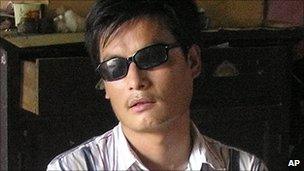
Chen Guangcheng, a blind activist known as the "barefoot lawyer", clashed with the authorities over the enforcement of China's one-child policy.
He defended women whom he said were being forced into late-term abortions and being sterilised by over-zealous health officials in Linyi city, Shandong Province.
He served four years in jail on charges of damaging property and disrupting traffic.
The sentence drew international criticism, with campaigners and supporters claiming that the prosecution was politically motivated.
Mr Chen was released in September 2010 and said in a secretly shot video in February 2011 that he and his wife were unable to leave their home.
A BBC team who tried to visit him in his home village in November 2011 were prevented from doing so.
On 27 April he arrived in Beijing, having escaped from house arrest. A few hours later, a video of Mr Chen appeared on the internet in which he said he was free.
He took refuge in the US embassy but left it after six days on 2 May, of his own volition, according to the state news agency Xinhua.
He then spent time in hospital for medical treatment but then said that he wanted to go to the US because he feared for his safety.
Amid a diplomatic crisis between the US and China over his fate, Mr Chen was offered a place to study law at New York University after Beijing said he would be allowed to apply to study abroad.
He and his family flew to the US on 19 May.
LIU XIAOBO: Activist, in jail
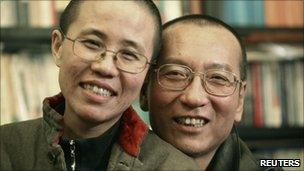
Liu Xiaobo, 54, was a key leader in the Tiananmen Square protests in 1989.
On Christmas Day 2009 he received an 11-year sentence for "inciting subversion" after drafting Charter 08 - which called for multi-party democracy and respect for human rights in China.
Announcing their decision to award him the Nobel Peace Prize in October 2010, the Nobel committee described Mr Liu as "the foremost symbol" of the human rights struggle in China.
His wife, Liu Xia, has been under house arrest since the award was announced, and friends and supporters have been prevented from leaving China.
HU JIA: Activist, released from jail
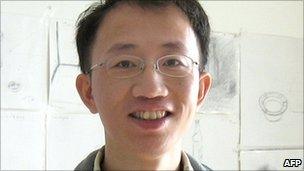
Hu Jia, a prominent environmentalist and Aids activist, was released in June 2011 after serving a three-and-a-half year jail sentence for "inciting subversion" - the same charge as Liu Xiaobo.
The state-owned Xinhua news agency reported that Mr Hu wrote articles criticising the Chinese political system, and accepted interviews with foreign journalists.
Human rights groups say the Chinese authorities put Mr Hu in prison to silence him ahead of the Beijing Olympic Games in 2008, and that his jail term was a warning to opponents of the Communist Party.
His wife, Zeng Jinyan, herself an activist, has been under effective house arrest, with their young child, since Mr Hu's detention in 2008.
In April 2012, Mr Jia told the BBC he had met fellow dissident Chen Guangcheng at the US embassy following the latter's escape from house arrest.
GAO ZHISHENG: Lawyer, in jail
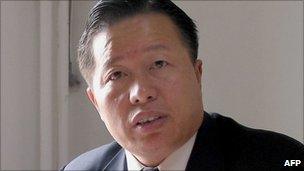
Gao Zhisheng, a writer and self-taught lawyer, became known in China for defending citizens against the state.
His pro-bono work has included cases for evicted homeowners, human rights activists, victims of medical malpractice and members of the banned Falun Gong spiritual movement.
He published a book, A China More Just, detailing his experiences of confronting China's legal and political system.
In August 2006, Mr Gao was arrested for "inciting subversion" through his writing.
He was sentenced to three years in prison in December 2006 but the jail term was suspended for five years. Mr Gao says he was tortured on several occasions while in detention.
He was also reportedly the target of an assassination attempt.
He went missing in February 2009, reappeared briefly a year later to say he was giving up campaigning for the sake of his family, and went missing again in the western province of Xinjiang in April 2010.
In December 2011 state media reported that Mr Gao had been sent back to jail for three years, having "seriously violated probation rules".
His brother Gao Zhiyi was allowed to visit him at the Shaya County jail in Xinjiang's Aksu prefecture for 30 minutes in March.
Gao Zhiyi told journalists that he met Gao Zhisheng, but it was "not convenient" for him to elaborate further.
Mr Gao's wife and two children sought asylum in the United States in early 2009 and are now living in California.
GAO YAOJIE: Aids activist, in exile
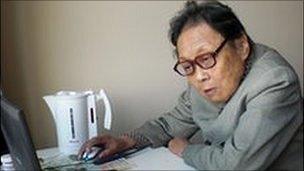
In her 80s, Gao Yaojie, a celebrated doctor, is one of China's oldest and most famous dissidents.
Known as Grandma Gao, she travelled across the country treating HIV/Aids patients, often at her own expense.
She refused to keep quiet about what she found. She believes the vast majority of people infected with HIV in China caught the virus as a result of selling their blood for money.
She wrote about China's blood-selling epidemic of the 1990s in three books, overcoming a climate of secrecy to end the practice and draw attention to the scandal.
The authorities were initially lenient with her, but Beijing grew uncomfortable with her criticism of provincial Communist leaders.
Fearing for her freedom, she fled the country in 2009, and lives in exile in New York.
BAO TONG: Former official, under house arrest
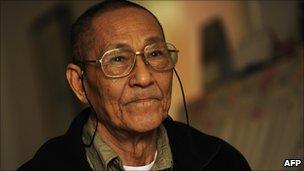
In the late 1980s, Bao Tong was one of the most powerful men in China, as adviser to the then-Communist Party chief Zhao Ziyang.
Both men opposed the brutal crackdown on students during the Tiananmen Square protests of 1989, and both suffered for their stance.
Within weeks, Mr Zhao was ousted and Mr Bao jailed for seven years.
He has been under house arrest since his release in 1997, but still managed to sign the Charter 08 manifesto and reportedly smuggle out audiotapes made by Mr Zhao to Hong Kong, where they formed the basis of a memoir published after his death.
NI YULAN: Lawyer and activist
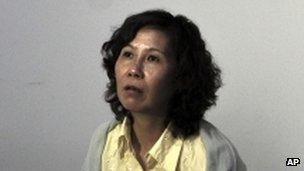
Ni Yulan is best known as a campaigner for the rights of people evicted from their homes to make way for Beijing's 2008 Summer Olympics.
A former lawyer, Ms Ni was jailed, beaten and disbarred, and her own home was bulldozed by authorities after a six-year battle in 2008.
She was first detained by police in 2002 for filming the forced demolition of a client's home, and was beaten so badly that she is unable to walk without the aid of crutches, human rights groups say.
She went on trial in December 2011 along with her husband Dong Jiqin, accused of fraud, libel and causing a disturbance.
She had been sentenced to two years and eight months, while Dong Jiqin was given two years
An appeals court dismissed her fraud conviction in 27 July, reducing her jail time by two months. She remains in jail because of the public disturbance conviction.
SHI TAO: Journalist, in jail
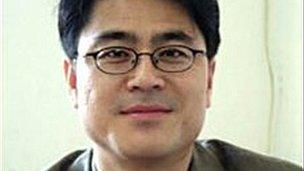
Shi Tao, who worked for the Contemporary Business News in China, was jailed for 10 years in 2005 for "divulging state secrets" - a charge commonly used to prosecute dissidents and pro-democracy activists.
Mr Shi was jailed for sending on to foreign websites an e-mail from the ruling Communist Party warning journalists not to cover the 15th anniversary of the Tiananmen Square massacre in 2004.
His case has become a cause celebre for free speech campaigners - not least because internet firm Yahoo was accused of informing on him.
The US-based web giant passed on details of his whereabouts to the authorities, and has since apologised to Shi Tao's mother.
DING ZILIN: Activist, presumed house arrest
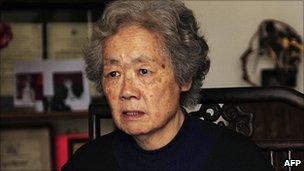
Ding Zilin's teenage son was shot in the back by soldiers during the 1989 Tiananmen Square protests.
Along with other bereaved parents, she formed a group called the Tiananmen Mothers, which has spent the past two decades pushing for a full account of what happened that night in Beijing.
The former philosophy professor and her husband are believed to be under house arrest.
Liu Xiaobo has said in the past that the Tiananmen Mothers should win the Nobel Peace Prize for their work.
QIN YONGMIN: China Democracy Party co-founder
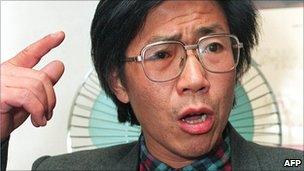
Just days after completing a 12-year jail term for subversion, Qin Yongmin vowed to advance human rights and democracy in China.
Mr Qin was sentenced to prison in 1998 after he and other activists tried to officially register the China Democracy Party.
Previously, Mr Qin was jailed from 1981-1989 as a "counter-revolutionary" following China's "democracy wall" period of political openness.
In 1993, he was sentenced to two years in a labour camp for drafting the "Peace Charter," a manifesto that called for a re-evaluation of the 1989 Tiananmen protests and the release of political prisoners.
"As a democrat, this is my life. One day, the China Democracy Party will be legal in China, but this will take time," he said in a phone interview with AFP from his home in Wuhan.